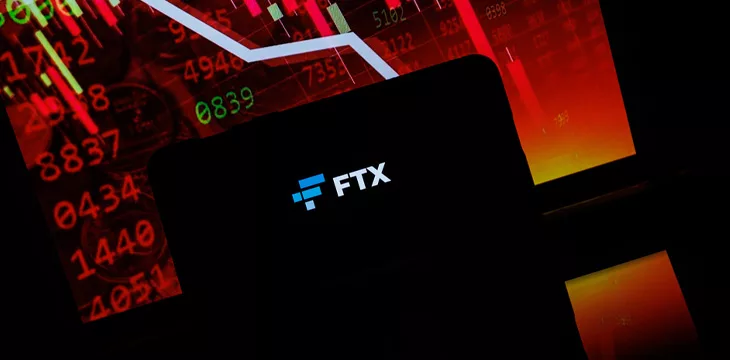|
Getting your Trinity Audio player ready...
|
Disgraced FTX founder Sam Bankman-Fried (SBF) is learning the hard way that hell hath no fury like a woman scorned and/or denied sufficient equity in your fraud ring.
Tuesday brought the start of Week 2 of SBF’s criminal trial on charges related to the November 2022 collapse of FTX, its market-maker Alameda Research, and numerous other SBF-affiliated entities. The star witness taking the stand in the Manhattan court was none other than Caroline Ellison, Alameda’s final CEO and SBF’s former love interest.
Ellison’s appearance was preceded by the second day of testimony from Gary Wang, FTX’s co-founder/CTO, who—along with Ellison—reached a plea deal with federal prosecutors last December. Wang’s initial day on the stand saw him poke holes in an SBF tweet from July 2019 that claimed Alameda enjoyed no special privileges on FTX. Last Friday, Wang told the court that “we gave special privileges to Alameda Research to allow it to withdraw unlimited funds from FTX and lied about it.”
Alameda is a liquidity provider on FTX but their account is just like everyone else's. Alameda's incentive is just for FTX to do as well as possible; by far the dominant factor is helping to make the trading experience as good as possible.
— SBF (@SBF_FTX) July 31, 2019
Alameda’s FTX account had a $65 billion ‘line of credit,’ effectively giving it carte blanche to make (and lose) wild bets with other people’s money and without fear of liquidation. Wang testified that SBF told him “several times to make sure that Alameda’s account is never liquidated on FTX.”
Wang also testified that Alameda’s inept trading strategies left its FTX account with a negative balance as early as 2019—the year FTX launched. When FTX imploded, Alameda owed the exchange around $8 billion in ‘borrowed’ customer funds, and nothing in SBF’s collapsed ‘crypto’ empire was sufficient to plug this hole.
SBF’s legal team has so far attempted to paint their client as an idiot rather than a criminal. The same might be said for his attorneys, who have been repeatedly admonished by U.S. District Judge Lewis Kaplan for asking questions that witnesses have already answered.
On Monday, SBF’s team asked Kaplan for the right to cross-examine Wang about his interactions with FTX/Alameda attorneys regarding hundreds of millions of dollars in ‘personal loans’ that Wang (and other SBF cronies) received from Alameda. Kaplan previously rejected plans by SBF’s team to mount an ‘advice of counsel’ defense, in which SBF is portrayed as a hapless child simply doing what his more experienced counsel recommended.
As live-tweeted by the ever-reliable Inner City Press, Wang confirmed that ‘Dan’ aka criminal-minded attorney Daniel Friedberg, worked on the ‘promissory notes’ governing these loans. SBF’s team got Wang to admit that he didn’t discuss the nature of these notes with the attorneys before signing the documents.
Everdell: You got over $200 million in loans from Alameda?
Gary Wang: Yes.
Everdell: To make venture investments, and to buy a house, right?
Wang: I used $200,000 for a house.
Everdell: What lawyers worked on the promissory notes?
Wang: General counsel, under Dan— Inner City Press (@innercitypress) October 10, 2023
SBF’s team also tried to get Wang to throw Ellison under the bus, suggesting that Ellison’s alleged failure to hedge Alameda positions was the principal cause of FTX’s demise. Wang replied that while Ellison was Alameda’s last CEO, “I don’t know who made the decision.”
The dating shame
And then it was Ellison’s turn, although before she even entered the room, SBF’s team announced it had “some burning issues.” (Nothing a little penicillin wouldn’t cure, no?) An unimpressed Kaplan replied: “And I’ll do it on my timeline.”
Once Ellison was seated, prosecutors wasted no time in asking if she’d committed crimes during her Alameda stint. She replied by repeating all the crimes SBF has been charged with—fraud, money laundering, conspiracy—adding that SBF “directed me to commit these crimes.”
Asked by prosecutors to identify SBF, Ellison reportedly took about 30 seconds to locate SBF in the courtroom. It’s unclear whether Ellison’s eyesight really is that bad, whether SBF’s newly close-cropped hair made him that unrecognizable, or whether she was just savoring the opportunity to make SBF sweat.
Ellison confirmed that, at SBF’s direction, Alameda took “several billions of dollars” from FTX customers and blew it on investments. All told, Ellison said Alameda took around $14 billion from FTX customers to repay Alameda’s lenders, only a fraction of which Alameda was ultimately able to return to FTX. Ellison also admitted to cooking up fake balance sheets so lenders would view Alameda as “less risky than it was.”
Following a lunch break, prosecutors asked Ellison about her personal relationship with SBF, which included Ellison’s claim that SBF told her he had an ambition to become President of the United States someday. He admitted that this was a long shot. (Presumably, SBF would be playing League of Legends while taking the oath of office.)
We got a glimpse into what kind of world leader SBF might have been—as well as explaining a lot of his inept business strategies—when Ellison recalled his musings on how all risks were acceptable if there was “positive EV [expected value].” Ellison claimed SBF said he’d be “willing to flip a coin and destroy the world [if he lost], as long as a win would make it twice as good.”
Ellison also confirmed that Alameda served as a ‘pass-through’ for FTX due to the latter’s inability to secure U.S. banking relationships. Much of this skullduggery was accomplished through North Dimension, the shell company set up by Friedberg, to which FTX customers were directed to make their deposits.
As for the total “ten to twenty billion dollars” in FTX customer funds that Alameda had at its disposal, Ellison said this was used to “repay loans, investments, and stablecoin conversions like USDC. That was about $2 billion,” with the rest allocated to “other purposes.” In 2020, Ellison said she asked SBF whether Alameda’s use of FTX funds would cause auditors to balk, prompting him to tell her not to worry because ‘the auditors won’t be looking at that.’
CZ & me
Ellison was named co-CEO of Alameda in 2021 despite her own doubts regarding her qualifications. Regardless of her new title, Ellison claimed she “checked everything with [SBF]. He was the person I reported to. He could fire me.”
Ellison said she earned a $200,000 salary at Alameda but received a $20 million bonus in 2021. But she had no equity in Alameda and just a 0.5% stake in FTX. Ellison also received ‘loans’ including $3.5 million “for a gambling company people at FTX wanted to put in my name since I wasn’t on the books of FTX.” (This may or may not be a reference to Stake.com, the cryptocurrency-focused online casino for which attorney Friedberg did some consulting work pre-launch.)
The discussion soon turned to SBF’s 2021 buyout of the 20% stake in FTX held by Changpeng ‘CZ’ Zhao, founder of the rival Binance exchange. At the time, CZ’s renowned disdain for regulations and laws he didn’t like was complicating FTX’s efforts to secure operating licenses in certain jurisdictions. SBF told Ellison and Alameda’s other co-CEO, Sam Trabucco, that Binance “would cause trouble” if CZ wasn’t redeemed pronto.
Ellison said SBF told her the Binance buyback should be done via Alameda, which Ellison said at the time relied on funds from “third-party crypto lending desks,” including Digital Currency Group’s (DCG) Genesis Global Capital (which went bankrupt post-FTX crash). Ellison claimed SBF viewed Alameda’s line of credit “as a fund to use for our needs.”
S(h)am coins
Regarding FTX’s in-house FTT token, which was initially offered to the public at 10¢ apiece but later soared as high as $50, Ellison claimed SBF directed Alameda to start buying FTT anytime its fiat value slipped below $1. But SBF got “upset” with Ellison whenever she “discussed our FTT trading in front of others.”
Ellison said she initially resisted SBF’s directions to put FTT on Alameda’s balance sheet, in part because “we couldn’t sell it for the current price.” However, she did eventually list it on the balance sheet “to get loans from Genesis.” Ellison also noted that Alameda was “a large holder” in what she called “Sam coins, including Solana, which he didn’t create but played a big role in promoting.”
Ellison kept a Google Doc on “Sam’s bad case scenario,” including the $10 billion paper value of various illiquid ‘Sam coins’ that Ellison acknowledged couldn’t be sold without tanking their fiat price by 50%. Asked by prosecutors how it was possible that certain investments on the balance sheet were marked down 100%, Ellison responded simply: “They were speculative.”
Faced with the likelihood that Genesis could “freak out immediately” and call in its loans, Ellison said the SBF-approved plan was to “borrow” up to $7 billion more from FTX customer funds. Wang previously testified that “ultimately, the money [repaid to Genesis] came from FTX customers.”
These revelations raise serious questions about the August decision by the FTX Debtors to scrap their demand for Genesis to return the roughly $4 billion it received from FTX shortly before the exchange went belly-up, settling instead for Genesis repaying a mere $175 million. Simply put, DCG boss Barry Silbert has even more explaining to do.
Ellison will be back on the stand Wednesday to finish up her direct examination, after which SBF’s team will get a chance to poke holes in her story.
Lottery tickets: not legal tender
Last Friday, prosecutors asked Kaplan to bar testimony on whether or not any of the venture capital investments that SBF made (with his customers’ money) might yet prove a multi-billion-dollar lottery ticket and enable all FTX creditors to be made whole. (Prosecutors are trying to ensure that the jury understands that, regardless of whether or not SBF hoped to return the stolen funds at some later date, taking without asking is still a crime.)
In a Friday filing, prosecutors asked Kaplan to prohibit SBF’s team from discussing a $500 million stake SBF took in AI start-up Anthropic in April 2022. SBF’s team wants to say that this investment is likely worth a lot more now that other investors—including Amazon and Google—have taken their own stakes in Anthropic. Prosecutors argue that this potential payday is irrelevant to the proceedings at hand and “would necessitate a mini trial regarding the value of assets available through the bankruptcy.’
Late Tuesday, SBF’s team filed their response to the prosecutors’ motion, arguing that prosecutors have “repeatedly raised Alameda’s venture investments during the trial” and thus the defense has the right to “introduce evidence of positive investment outcomes (i.e., Anthropic) of such venture investments to rebut evidence and argument from the Government.”
SBF’s team also asked Kaplan to rethink his ruling regarding the ‘advice of counsel defense’ as it pertains to Ellison’s testimony. Since prosecutors likely plan to quiz Ellison on SBF directing her to enable auto-delete features on certain messaging apps, SBF’s team wants to cross-examine Ellison on which lawyers were present during these instructions and their role in this decision.
The prosecutors’ warnings of a ‘mini-trial’ may be intended to play on Kaplan’s impatience with the pace of the proceedings. At the end of Tuesday’s session, Kaplan asked both sides for estimated timelines for wrapping things up, with prosecutors saying they’d be done by October 26th or 27th, while the defense said it might take another week to 10 days to present its case.
Follow CoinGeek’s Crypto Crime Cartel series, which delves into the stream of groups—from BitMEX to Binance, Bitcoin.com, Blockstream, ShapeShift, Coinbase, Ripple,
Ethereum, FTX and Tether—who have co-opted the digital asset revolution and turned the industry into a minefield for naïve (and even experienced) players in the market.

 04-26-2025
04-26-2025 





